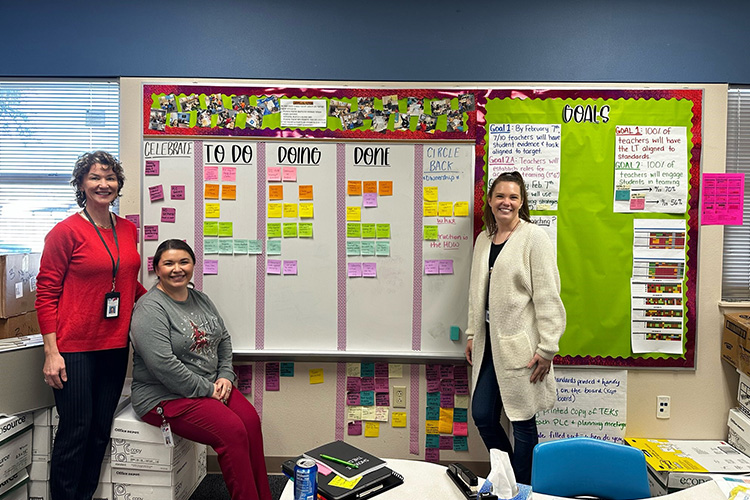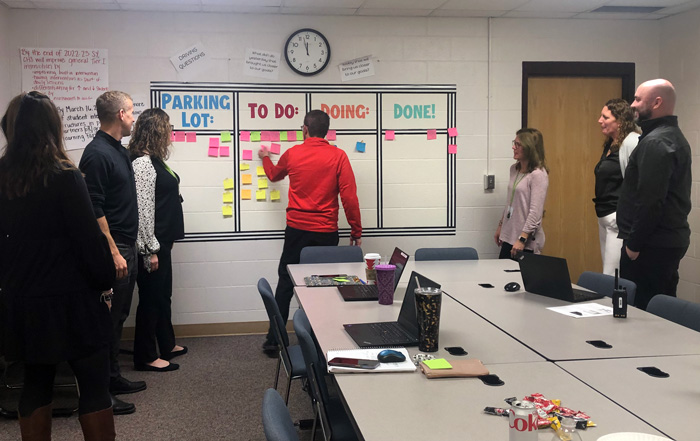To drive meaningful, schoolwide change, leaders must go beyond compliance-driven approaches and gain a holistic understanding of the factors influencing student learning. A well-executed School Comprehensive Needs Assessment (SCNA) provides unbiased, research-backed insights necessary to identify strengths, uncover hidden challenges, and implement strategic improvements that lead to lasting student success.
Uncover Strengths and Areas for Growth
with a School Comprehensive Needs Assessment
Systems-Based Approach to School Improvement
Instructional Empowerment’s SCNA process is designed to measure the systems and structures that shape student outcomes. Unlike assessments that focus narrowly on achievement data, the SCNA evaluates critical areas, including:
- Leadership effectiveness – Assessing the impact of school leadership on culture, decision-making, and instructional quality.
- Instructional rigor and alignment – Measuring the level of rigor in student learning, teaching practices, and curriculum effectiveness.
- School culture and environment – Evaluating conditions that foster or hinder student engagement and agency.
- Operational efficiency – Identifying opportunities to streamline daily school operations, from arrival and dismissal to cafeteria procedures.
This comprehensive approach ensures that school leaders have the insights needed to make data-driven decisions that improve student learning experiences.
Why Partner with a Third-Party Provider?
While it may seem practical for a school or district to conduct their own SCNA, this often comes with limitations. Without the objectivity, expertise, and research-proven methodologies of a third-party evaluation, schools risk overlooking critical gaps and opportunities for growth. A thorough, external SCNA ensures a data-driven, unbiased assessment that leads to long-term success. Some key advantages of partnering with a third-party provider include:
By choosing a third-party for your School Comprehensive Needs Assessment, schools gain more than just an assessment – they receive a strategic roadmap for sustainable improvement, backed by objective insights and extensive research.
- Unbiased and Objective Analysis – Internal assessments can be influenced by existing priorities, internal politics, or limited perspectives. A third party provides neutral, research-based evaluation that ensures findings are rooted in evidence, not assumptions.
- Expertise and Research-Backed Insights – At Instructional Empowerment, our Applied Research Center leverages data from tens of thousands of classrooms, ensuring that our assessments align with proven best practices. Schools benefit from methodologies that go beyond internal knowledge, incorporating national trends and proven educational strategies.
- Confidentiality and Trust – Teachers, administrators, and staff may be more forthcoming with feedback when speaking with an external evaluator. This results in more accurate data, particularly in sensitive areas such as school culture, resource allocation, and instructional effectiveness.
Objective and Systems-Based Evaluation
Our team of expert educators conducts an in-person, unbiased assessment, using research-validated methods to analyze both quantitative and qualitative data. The SCNA process includes:
- An impartial perspective on the inner workings of schools through a Rigor Appraisal, a non-evaluative tool that collects information about critical systems that impact teacher practice and student learning.
- Stakeholder interviews with school leadership, teachers, support staff, students, parents, and community members.
- Classroom observations through a Rigor Classroom Walk, a research-based walkthrough tool that measures the quality and effectiveness of Tier 1 instruction.
- A Conditions Diagnostic to evaluate school climate, discipline policies, and resource allocation.
- A Curriculum Needs Assessment, ensuring alignment with state standards and instructional goals.
- A School Leadership Team Assessment, examining leadership dynamics and their impact on school success.
This systems-based approach provides a clear, interconnected picture of how leadership, instruction, and school culture influence student achievement.
Real Results, Real Impact
From Data to Action: A Blueprint for School Improvement
A needs assessment is only valuable if it leads to real, actionable change. Upon completion of the SCNA, schools receive a detailed findings report with research-backed recommendations tailored to their unique context. Our expert educators guide school and district leaders in developing a structured action plan that includes:
- Prioritizing high-impact improvements based on research-validated findings.
- Setting measurable goals to track progress and ensure accountability.
- Implementing professional development and coaching for sustainable growth.
By leveraging these insights, schools move beyond compliance to create a strategic roadmap for student achievement and continuous improvement.
Why Choose Instructional Empowerment’s SCNA?
100% of schools that have partnered with Instructional Empowerment have improved student outcomes – even in the face of challenges like the pandemic.
Our collaborative approach ensures you’re an active participant in every stage of the process. We conduct an objective, data-driven evaluation of your school’s strengths and areas of growth, free from internal biases. By gathering comprehensive stakeholder feedback, benchmarking against national trends, and providing actionable recommendations, we help you drive real, measurable change.
Grounded in research and accountability, your SCNA becomes more than just a report – it’s the strategic roadmap for lasting school transformation.
See How a School Comprehensive Needs Assessment (SCNA) Can Empower Your School
Speak to an expert educator today about a free demonstration to learn how SCNA can provide the insights you need to drive instructional excellence.





